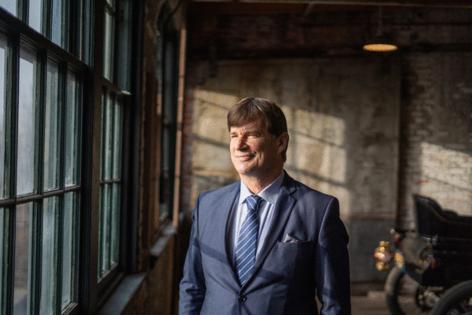Ford CEO Jim Farley says semi-solid state batteries are 'promising for production'
Published in Business News
Ford Motor Co. CEO Jim Farley on Thursday said semi-solid state batteries are "looking very promising for production," as the automaker has emphasized the need for breakthroughs in electric vehicle technology to improve affordability.
"We're getting more and more excited about the potential," Farley said in response to a shareholder question during the Dearborn, Michigan, automaker's virtual annual shareholder meeting. "We don't see them ready for mass production yet, but we believe semi-solid state could be in our lineup in the coming years."
The largest cost of EVs is their batteries. Solid state batteries are one way researchers are seeking to address that challenge, since they potentially can offer a greater energy density. That means the vehicle would need fewer battery cells to travel the same distance as a vehicle with lithium-ion batteries.
In these traditional EV batteries, lithium ions flow through a liquid electrolyte to charge and discharge the battery. In a solid state battery, the liquid electrolyte and separator often are replaced by a polymer or ceramic. Semi-solid state batteries are a variation of that, typically composed of a solid, conductive material suspended in a liquid electrolyte to help ease the movement of the lithium ions.
The development of these batteries, though, takes time because of extensive testing required, longevity needed from the batteries, costs and manufacturing challenges. Ford has invested in Colorado-based all-solid-state startup Solid Power Inc., which uses a sulfide-based electrolyte. Farley said Ford's Ion Park team in southeast Michigan is working on the semi-solid state batteries.
Farley said leveraging data collected from vehicles, Ford has found most long road trips don't go beyond 350 miles before some kind of break. Offering that as a competitive range seeks to balance the need for range and the ability of consumers to afford an EV.
Ford expects its Model e electric vehicle division to lose up to $5.5 billion this year after recording a $1.32 billion loss in the first quarter, double from the same period the year prior.
Meanwhile, Ford will have refreshed 60% of the lineup in its Ford Blue division, which includes internal combustion engine vehicles and hybrids, over the past couple of years by the end of 2024, executive chairman Bill Ford Jr. said during the meeting.
"I would argue," he said, "that our ICE business is healthier than it's ever been."
During the annual meeting, 92.9% of shareholders in an advisory vote approved executive compensation packages. Farley's 2023 compensation package was valued at nearly $26.5 million, and Ford's was $20.6 million.
Proposals made by shareholders to have equal voting rights per share, to hold a child labor audit and to increase supply chain traceability disclosures were rejected.
©2024 www.detroitnews.com. Visit at detroitnews.com. Distributed by Tribune Content Agency, LLC.







Comments